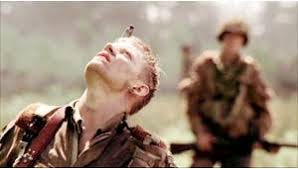Band of Brothers, the totemic miniseries by HBO that follows the members of Easy Company, Second Battalion of the 506 Parachute Infantry Regiment, US 101st Airborne from 1943 to 1945, is an epic ensemble that shows how the unit transformed from a bunch of green recruits from small town America to an elite unit that ended the war in Hitler’s Eagle Nest.
However many episodes focus on individual soldiers point of view and in episode 3, Carentan, we are introduced to Private Albert Blithe.
The episode begins with Blithe standing alone in a field where he is found by other members of Easy Company. Though Blithe claims he got lost after the drop of D-Day, he later admits he didn't try to find his company right away.
Blithe then tries to make himself a part of the company, but during a battle, he buries his head and cries out in fear. Following another firefight, Blithe suddenly loses his vision. After talking to Winters who assures Blithe they'll transport him back to England, Blithe's sight …
Keep reading with a 7-day free trial
Subscribe to GMan’s Musings On History and Politics to keep reading this post and get 7 days of free access to the full post archives.




